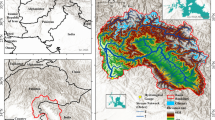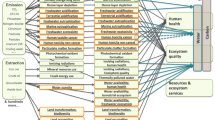Abstract
Climate change challenges water managers and researchers to find sustainable management solutions, in order to avoid undesirable impacts on water resources, environment and water-dependent sectors. Needed are projections into the future for the main driving forces, the resulting pressures on water resources, and quantification of the impacts. Modeling studies can play an important role in investigating, quantifying, and communicating possible impacts of climate change, with account of uncertainty of the results. However, climate change related impacts and a need for adaptation still play a minor role in current river basin management plans that have to comply e.g. with the EU Water Framework Directive (WFD). One important reason is that climate impact assessment is generally done in research institutes, while management plans are designed by practitioners working in national and regional environmental agencies and water supply companies. Knowledge transfer from science to practice and visa versa is often missing. In the present study, we propose a methodology and a case study for model-supported decision making in the water sector applicable to a participatory water resources planning process. The methodology is applied in a case study investigating climate change impacts on water resources. The case study area is the German State of Saxony-Anhalt, where the task was to develop a climate change impact assessment including possible adaptation measures as basis for a federal adaptation directive.
Similar content being viewed by others
References
Arnell NW (1999) The effect of climate change on hydrological regimes in Europe: a continental perspective. Global Environ Chang: Human and Policy Dimensions 9(1):5–23
ATV-DVWK Deutsche Vereinigung für Wasserwirtschaft, A.u.A.e.V. (2000) Die Elbe und ihre Nebenflüsse. Belastung und Trends, Bewertung, Perspektiven. Hennef
Becker A, Soncini-Sessa R, Castelletti A, Hattermann FF, Willems P, Stålnacke P, Laurans Y, de Lange WI (2010) How can models help implementing the water framework directive? In: Hattermann FF, Kundzewicz ZW (eds) Water framework directive: model supported implementation—a water manager’s guide. IWA, London, pp 11–54
Bronstert A (2004) Rainfall-runoff modelling for assessing impacts of climate and land-use change. Hydrol Process 18(3):567–570
Eisenreich SJ (2005) Climate change and the European water dimension. European Commission–Joint Research Centre, Ispra
Enke W, Deutschländer Th, Schneider F (2005a) Results of five regional climate studies applying a weather pattern based downscaling method to ECHAM4 climate simulations. Meteorol Z 14:247–257
Enke W, Schneider F, Deutschländer Th (2005b) A novel scheme to derive optimised circulation pattern classifications for downscaling and forecast purposes. Theor Appl Climatol 82:51–63. doi:10.1007/s00704-004-0116-x
EC (2000) Establishing a framework for community action in the field of water policy. Directive 2000/60/EC of the European Parliament and of the Council of 23 October 2000, Official Journal of the European Communities, Brussels, Belgium
EC (2007) Assessment and management of flood risks. Directive 2007/60/EC of the European Parliament and of the Council of 26 November 2007, Official Journal of the European Communities, Brussels, Belgium
Gerstengarbe FW, Werner PC (2005) Simulationsergebnisse des regionalen Klimamodells STAR. In: Wechsung F, Becker A, Gräfe P (eds) Integrierte Analyse der Auswirkungen des globalen Wandels auf Wasser, Umwelt und Gesellschaft im Elbegebiet, PIK-Report 95. ISSN 1436–0179
Gooch G, Stålnacke P (eds) (2010) Science, policy and stakeholders in water management—an integrated approach to river basin management. Earthscan, London, p 192. ISBN 9781844079193
Hattermann FF, Kundzewicz ZW (eds) (2010) Water framework directive: model supported implementation - a water manager’s guide. IWA, London, p 282
Hattermann FF, Krysanova V, Wechsung F, Wattenbach M (2004) Integrating groundwater dynamics in regional hydrological modelling. Environ Model Softw 19(11):1039–1051
Hattermann FF, Wattenbach M, Krysanova V, Wechsung F (2005) Runoff simulations on the macroscale with the ecohydrological model SWIM in the Elbe catchment—validation and uncertainty analysis. Hydrol Process (19):693–714
Hattermann FF, Krysanova V, Habeck A, Bronstert A (2006) Integrating wetlands and riparian zones in river basin modeling. Ecol Model 199:379–392
Hattermann FF, Gömann H, Conradt T, Kaltofen M, Kreins P, Wechsung F (2007) Impacts of global change on water-related sectors and society in a trans-boundary central European river basin—part 1: project framework and impacts on agriculture. Adv Geosci 11:85–92
Hattermann FF, Krysanova V, Post J, Dworak Th, Leipprand A, Kadner S, Kabat P (2008a) Understanding consequences of Climate Change. In: The adaptiveness of IWRM, an analysis of European IWRM research, IWA, London, pp 89–112
Hattermann FF, Post J, Krysanova V, Conradt T, Wechsung F (2008b) Assessment of water availability in a Central-European River Basin (Elbe) under climate change. Adv Clim Change Res 4:42–50
Huang S, Krysanova V, Österle H, Hattermann FF (2010) Simulation of spatiotemporal dynamics of water fluxes in Germany under climate change. Hydrol Process 24(23):3289–3306
IPCC (2000) IPCC special report on emission scenarios—summary for policymakers. A special report of IPCCWorking Group III. Intergovernmental panel on climate change. http://www.ipcc.ch/pdf/special-reports/spm/sres-en.pdf
IPCC (2007a) Climate change 2007: the physical science basis—summary for policymakers. Contribution of Working Group I to the Fourth Assessment Report of the Intergovernmental Panel on Climate Change. IPCC Secretariat
IPCC (2007b) Climate change 2007: impacts, adaptation and vulnerability—summary for policymakers. Working Group II Contribution to the Fourth Assessment Report of the Intergovernmental Panel on Climate Change. IPCC Secretariat
Kabat P, Schulze RE, Hellmuth ME, Veraart JA (eds) (2002) Coping with impacts of climate variability and climate change in water management: a scooping paper. DWC-Report no. DWCSSO-01(2002), International Secretariat of the Dialogue on Water and Climate, Wageningen
Krysanova V, Muller-Wohlfeil D-I, Becker A (1998) Development and test of a spatially distributed hydrological/water quality model for mesoscale watersheds. Ecol Model 106(2–3), 261–289
Krysanova V, Kundzewicz ZW, Pińskwar I, Habeck A (2006) Regional socio-economic and environmental changes and their impacts on water resources on example of Odra and Elbe basins. Water Resour Manag 20(4):607–641
Kundzewicz ZW, Schellnhuber HJ (2004) Floods in the IPCC TAR perspective. Nat Hazards 31(1):111
Kundzewicz ZW, Budhakooncharoen S, Bronstert A, Hoff H, Lettenmaier D, Menzel L, Schulze R (2002) Coping with variability and change: floods and droughts. Nat Resour Forum 26:263–274
Kundzewicz ZW, Mata LJ, Arnell N, Döll P, Kabat P, Jiménez B, Miller K, Oki T, Şen Z, Shiklomanov I (2007) Freshwater resources and their management. In: Parry ML, Canziani OF, Palutikof JP, Hanson CE, van der Linden PJ (eds) Climate change 2007: impacts, adaptation and vulnerability. Contribution of Working Group II to the Fourth Assessment Report of the Intergovernmental Panel on Climate Change, Cambridge University Press, Cambridge, UK and New York, NY, USA; http://www.ipcc.ch/pdf/assessment-report/ar4/wg2/ar4-wg2-chapter3.pdf
Kundzewicz ZW, Mata LJ, Arnell N, Döll P, Jiménez B, Miller K, Oki T, Şen Z, Shiklomanov I (2008) The implications of projected climate change for freshwater resources and their management. Hydrol Sci J 53(1):3–10
Lehner B, Heinrichs T, Döll P, Alcamo J (2001) EuroWasser—model-based assessment of European water resources and hydrology in the face of global change. Kassel World Water Series 5, Center for Environmental Systems Research, University of Kassel, Kassel, Germany
Lehner B, Döll P, Alcamo J, Henrichs T, Kaspar F (2006) Estimating the impact of global change on flood and drought risks in Europe: a continental, integrated analysis. Clim Change 75(3): 273–299
Leipprand A, Dworak T, Benzie M, Berglund M, Hattermann FF, Krysanova V, Post J, Kadner S (2008) Impacts of climate change on water resources—adaptation strategies for Europe. Commissioned by the German Federal Environment Agency. http://www.climate-water-adaptation-berlin2007.org/documents/Climate_water_report_final_for_website.pdf
Loucks DP, Van Beck E (2005) Water resources systems planning and management. An introduction to methods, models and applications. UNESCO, Paris
Menzel L, Bürger G (2002) Climate change scenarios and runoff response in the Mulde catchment (Southern Elbe, Germany). J Hydrol 267(1–2):53–64
Nash IE, Sutcliffe JV (1970) River flow forecasting through conceptual models. J Hydrol 10:282–290
Orlowsky B, Gerstengarbe F-W, Werner PC (2008) A resampling scheme for regional climate simulations and its performance compared to a dynamical RCM. Theor Appl Climatol 92:3–4
Pahl-Wostl C (2002) Towards sustainability in the water sector: the importance of human actors and processes of social learning. Aquat Sci 64:394–411
Pahl-Wostl C (2010) The role of participation, social learning and adaptation in complex systems. In: Hattermann FF, Kundzewicz ZW (eds) Water framework directive: model supported implementation - a water manager’s guide. IWA, London, pp 87–92
Pahl-Wostl C, Craps M, Dewulf A, Mostert E, Tabara D, Taillieu T (2007) Social learning and water resources management. Ecol Soc 12(2):5. http://www.ecologyandsociety.org/vol12/iss2/art5/
Roeckner E, Bengtsson L, Feichter J, Lelieveld J, Rodhe H (1999) Transient climate change simulations with a coupled atmosphere-ocean GCM including the tropospheric sulfur cycle. J Climate 12(10):3004–3032
Roeckner E, Bäuml G, Bonaventura L, Brokopf R, Esch M, Giorgetta M, Hagemann S, Kirchner I, Manzini LKE, Rhodin A, Schlese U, Schulzweida U, Tompkins A (2003) The atmospheric general circulation model ECHAM 5. Part I: model description. Tech Rep, MPI for Meteorology, Hamburg, Germany
Sachsen-Anhalt (2010) Strategie des Landes zur Anpassung an den Klimawandel zusammen mit dem dazugehörigen Aktionsplan. Arbeitsgruppe des Landes Sachsen-Anhalt zum Klimawandel. Magdeburg. http://www.sachsen-anhalt.de/fileadmin/Elementbibliothek/Master-Bibliothek/Landwirtschaft_und_Umwelt/K/Klimaschutz/Klimawandel/LSA_Anpassungsstrategie_2010_04_14.pdf
Soncini-Sessa R, Castelletti A, Weber E (2007a) Integrated and participatory water resources management: theory. Elsevier, Amsterdam
Soncini-Sessa R, Cellina F, Pianosi F, Weber E (2007b) Integrated and participatory water resources management: practice. Elsevier, Amsterdam
Stanners D, Bourdeau P (1995) Europe’s environment: the Dobríš assessment. European Environment Agency, Office for Official Publications of the European Communities, Luxembourg
Tomassini L, Jacob D (2009) Spatial analysis of trends in extreme precipitation events in high-resolution climate model results and observations for Germany. J Geophys Res 114:D12113
Varis O, Kajander T, Lemmelä R (2004) Climate change and water: from climate models to water resources management and vice versa. Clim Change 66:321–344
Wechsung F, Kaden S, Behrendt H, Klöcking B (eds) (2008) Integrated analysis of the impacts of global change on environment and society in the Elbe basin. Weißensee, Berlin
Wenzel V (1999) Ein integrativer Algorithmus zur Unterstützung regionaler Landnutzungsentscheidungen. Flusseinzugsgebietsmanagement und Sozioökonomie, UFZ–Bericht 30, Umweltforschungszentrum Leipzig–Halle GmbH, Leipzig
Wenzel V (2008) The integrated methodological approach in a stringent language calculus. In: Wechsung F, Kaden S, Behrendt H, Klöcking B (eds) Integrated analysis of the impacts of global change on environment and society in the Elbe basin. Weißensee, Berlin
Wilby RL, Hay LE, Leavesley GH (1999) A comparison of downscaled and raw GCM output: implications for climate change scenarios in the San Juan River basin, Colorado. J Hydrol 225(1–2):67–91
Willems P, de Lange WJ (2007) Concept of technical support to science-policy interfacing with respect to the implementation of the European Water Framework Directive. Environ Sci Policy 10:464–473
Wood AW, Leung LR, Sridhar V, Lettenmaier DP (2004) Hydrologic implications of dynamical and statistical approaches to downscaling climate model outputs. Clim Change 62:189–216
Author information
Authors and Affiliations
Corresponding author
Rights and permissions
About this article
Cite this article
Hattermann, F.F., Weiland, M., Huang, S. et al. Model-Supported Impact Assessment for the Water Sector in Central Germany Under Climate Change—A Case Study. Water Resour Manage 25, 3113–3134 (2011). https://doi.org/10.1007/s11269-011-9848-4
Received:
Accepted:
Published:
Issue Date:
DOI: https://doi.org/10.1007/s11269-011-9848-4




